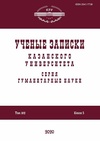Telling histories or accounting for aspects of the past: A historiographical choice in a European historical perspective
Telling histories or accounting for aspects of the past: A historiographical choice in a European historical perspective
Author(s): Rolf TorstendahlSubject(s): Middle Ages, Recent History (1900 till today), Semantics, 19th Century, Philosophy of History, Politics of History/Memory
Published by: Казанский (Приволжский) федеральный университет
Keywords: narration; telling; evidence; inference; theory of history; philosophy of history; historiography; representation; construction; memory; source criticism; postmodernism;
Summary/Abstract: The article departs from the difference between two types of historical writings, one narrating stories about actors and the other trying to bring about evidence that justify claims to know certain things about specific aspects of the past. From the Iliad and the Odyssey, telling stories have been a common way of presenting past events. Inscriptions and annals, as well as graves and monuments, urged to present posterity with evidence for acts and occurrences. Storytelling was always more popular than searching for evidence. In the 19th century, historians began to systematise their doubts about the truth of many stories. This source criticism has been refuted by many “historical theorists” in the late 20th and the early 21st centuries with the argument that claims that it is impossible to bring truth about the past and that all history is to be regarded as a kind of literature with, at best, symbolic “truth”. I want to reject this standpoint as based only on an internal “theory of history”-discourse and ask for analyses of actual historical research, which claims to produce new historical knowledge.
Journal: Ученые записки Казанского университета. Серия Гуманитарные науки
- Issue Year: 163/2021
- Issue No: 3
- Page Range: 9-20
- Page Count: 12
- Language: English

